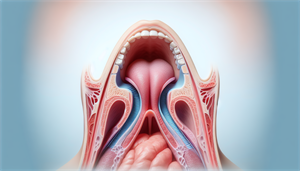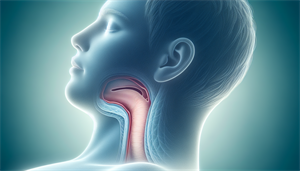Can TMJ cause snoring? The connection between your jaw joint and snoring might not be immediately evident, but TMJ can indeed contribute to this common sleep issue.
This article examines how malfunctions in the temporomandibular joint may lead to snoring, discusses symptoms that suggest a link, and outlines treatments to tackle the problem effectively.
Key Takeaways
-
TMJ disorder and snoring are linked as jaw misalignment from the disorder can lead to airway obstruction during sleep and consequently to snoring and sleep-disordered breathing conditions like sleep apnea.
-
Symptoms such as morning pain, fatigue, headaches, tooth pain, dental issues, and sleep disturbances often characterize TMJ-related snoring, signifying the need for appropriate identification and intervention.
-
Several treatment options for TMJ-related snoring include using oral appliances to reposition the jaw and enlarge the airway, lifestyle changes like stress management and diet, as well as seeking professional help like therapy, medication, and sleep studies.
The TMJ-Snoring Connection: Understanding the Link
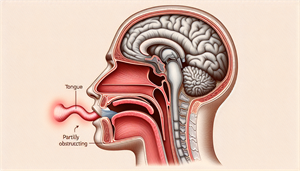
The link between a jaw joint issue like TMJ and something as seemingly unrelated as snoring may not be immediately clear. However, the connection becomes clearer when we consider the role of the temporomandibular joint in our breathing process. The misalignment of the temporomandibular joint and sleep-disordered breathing can result in airway obstruction and snoring. This happens as the body responds to sleep apnea by pushing the lower jaw forward to open up the collapsing airway during sleep, potentially leading to TMJ disorder and snoring.
Indicators such as wear and tear of the teeth from clenching and grinding, a narrow palate, and a large, scalloped tongue may suggest the presence of both sleep apnea and TMJ disorder. Moreover, there is an established association between signs and symptoms of sleep disorders like Obstructive Sleep Apnea (OSA) and the development of first-onset Temporomandibular Disorders (TMD).
Misaligned Jaw and Airway Obstruction
A misaligned jaw can cause the tongue to displace, partially blocking the airway and causing snoring. This can occur because the jaw misalignment narrows the airway, thereby worsening untreated sleep apnea symptoms. In some cases, continuous positive airway pressure (CPAP) therapy may be recommended to help keep the airway open and reduce snoring.
What if these breathing disorders continue and contribute to TMJ?
Sleep Disordered Breathing and TMJ
Sleep-disordered breathing conditions, like sleep apnea, can cause the lower jaw to displace, thereby contributing to the onset of TMJ disorder and snoring. The repetitive forward movement of the jaw places strain on the TMJ, heightening the risk of TMJ disorder.
In adults diagnosed with mild or moderate obstructive sleep apnea, 36.8% were identified to have temporomandibular joint disorder according to the Research Diagnostic Criteria for Temporomandibular Disorders (RDC/TMD). This significant relationship between sleep-disordered breathing and temporomandibular disorders is linked to both the initial development of TMD and the persistent symptoms of TMD.
Identifying TMJ-Related Snoring
The first step towards effective treatment is to identify TMJ-related snoring. Typical indicators such as morning pain and fatigue, as well as dental issues, can give us a clue. Individuals with TMJ disorder often experience:
-
Aggravated jaw pain in the morning
-
Headaches
-
Tooth pain
-
Sleep disturbances like snoring or sleep apnea.
Dental issues that may contribute to TMJ-related snoring include a sore or painful jaw, gasping for breath, tooth breakage, swollen gums, and the consequences of chronic snoring, such as a dry mouth, which could be associated with sleep apnea. These symptoms, combined with daytime tiredness or fatigue, difficulty concentrating, loud snoring, abrupt awakenings, exhaustion the next day, observed episodes of stopped breathing during sleep, and radiating headaches, can indicate the presence of TMJ-related snoring.
Morning Pain and Fatigue
Both TMJ disorder and sleep apnea can manifest as morning pain and fatigue. Typical symptoms linked to morning pain caused by TMJ disorder encompass pain or tenderness of the jaw and discomfort in one or both of the temporomandibular joints.
The fatigue in individuals with TMJ disorder can manifest as:
-
Widespread body pain
-
Linked to other conditions such as fibromyalgia and chronic fatigue syndrome
-
Exacerbated by issues like poor posture and nighttime grinding, leading to pain upon waking.
TMJ disorder can disrupt sleep by causing a variety of sleep disorder symptoms, such as:
-
Snoring
-
Sleep apnea
-
Frequent awakenings
-
Tension headaches
-
Migraines
-
Nighttime grinding
These disturbances in sleep quality can result in morning pain and fatigue.
Dental Issues
TMJ-related snoring can develop and worsen due to dental issues. Teeth grinding and clenching, also known as bruxism, can contribute to TMJ issues due to the strain they put on the joint and the facial muscles. Indications of teeth grinding and clenching associated with TMJ encompass:
-
headaches
-
facial pain
-
earaches
-
sore jaw muscles
-
tinnitus
-
difficulty in eating or moving the jaw.
Indeed, misaligned teeth can result in conditions that may lead to TMJ disorders. These disorders can then potentially contribute to snoring as a result of the misalignment of the jaw and obstruction of the airway during sleep.
Treatment Options for TMJ-Related Snoring
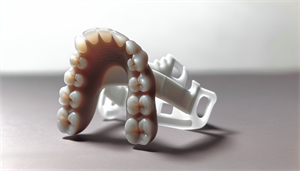
Fortunately, TMJ-related snoring isn’t a lifelong condition. There are various treatment options available, which include oral appliances, lifestyle changes, and seeking professional help. Oral appliances such as tongue-retaining or mandibular-repositioning appliances play a crucial role in enlarging the upper airway and reducing its potential to collapse, effectively preventing pauses in breathing and reducing snoring associated with TMJ disorders.
Various oral appliances, including custom-fit mouthguards, snore guards, and bite splints, may be recommended to address TMJ-related snoring by repositioning the jaw or providing cushioning to alleviate tension. However, it’s important for dentists to carefully consider the impact of the oral appliance on the jaw joint, its ability to position the jaw correctly, and its effectiveness in keeping the airway open to prevent discomfort, potential damage, or restriction of the airway.
Oral Appliances
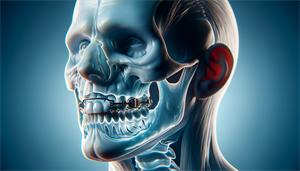
By repositioning the jaw and relieving joint tension, oral appliances are instrumental in preventing snoring and TMJ disorder. These appliances come in various forms, including mouth guards, and dental devices that stabilize the tongue and the upper and lower teeth, such as DynaFlex® Dorsal, Adjustable Herbst, TAP, EMA, and MicrO2.
Night guards, in particular, play a crucial role in addressing TMJ-related snoring by eliminating teeth grinding and clenching that contribute to jaw pain and providing protection to the teeth, thus reducing the stress on the jaw during sleep.
Lifestyle Changes
In managing TMJ-related snoring, lifestyle changes can hold equal importance as medical interventions. Weight loss, for instance, can have a significant positive impact on TMJ-related snoring. It is known to effectively address moderate to severe sleep apnea, which is closely linked to TMJ disorders through its impact on mastication function.
Implementing lifestyle changes such as stress management, practicing mouth and throat exercises, and engaging in coordination exercises can effectively reduce symptoms of TMJ myalgia and arthralgia. Additionally, incorporating a more nutritious diet comprising of fruits, vegetables, whole grains, and lean proteins has the potential to decrease inflammation in the body, offering benefits for TMJ-related snoring.
Professional Help
Though self-management is important, seeking professional help is essential for the effective management of TMJ-related snoring. Professionals diagnose TMJ-related snoring through a thorough clinical diagnosis, involving a comprehensive assessment of the patient’s medical history and a detailed physical examination. Dentists can offer various treatments for dental issues contributing to TMJ-related snoring, including:
-
Oral appliance therapy
-
Mouthguards or nightguards to prevent jaw clenching
-
Muscle relaxers
-
Anti-inflammatory medications to relieve pain and discomfort
Meanwhile, a sleep specialist plays a crucial role in managing TMJ-related snoring by:
-
Conducting sleep studies to diagnose related sleep issues
-
Recommending strategies to reduce stress
-
Employing oral appliance therapy as part of the treatment.
Preventing TMJ-Related Snoring
In the realm of TMJ-related snoring, proactive measures like regular dental checkups and stress management techniques are preferable over treatment. Regular dental checkups play a crucial role in identifying TMJ-related snoring issues as dentists can:
-
Detect symptoms of TMJ
-
Examine tenderness in the jaw muscles
-
Assess dental issues such as jaw misalignment using diagnostic tools like X-rays and CT scans.
On the other hand, stress can result in involuntary tightening of the jaw muscles, causing discomfort and overuse injuries. Additionally, stress can worsen teeth grinding and clenching, which are frequently associated with TMJ-related snoring.
Regular Dental Checkups
Potential TMJ-related snoring issues can be diagnosed early with regular dental checkups. Dentists can detect symptoms of TMJ, examine tenderness in the jaw muscles, and assess dental issues such as jaw misalignment using diagnostic tools like X-rays and CT scans.
Individuals with a higher risk of oral diseases, including those susceptible to TMJ, are advised to see a dentist every three to six months. Those with a lower risk should have a check-up every one to two years, although it is commonly recommended to have dental checkups twice a year. Dentists can offer various treatments for dental issues contributing to TMJ-related snoring, including:
-
Oral appliance therapy
-
Mouthguards or nightguards to prevent jaw clenching
-
Muscle relaxers
-
Anti-inflammatory medications to relieve pain and discomfort.
Stress Management
Stress management is another effective strategy to prevent TMJ-related snoring. Stress can result in heightened clenching of the jaw muscles, resulting in elevated pressure and tension in the jaw, potentially contributing to TMJ-related snoring.
Meditation can be beneficial in managing TMJ-related snoring by reducing pain catastrophizing, which in turn lessens the mental and physical manifestations of teeth grinding, and by promoting relaxation of the jaw muscles. Moreover, regular yoga and physical exercises can enhance posture, alleviate TMJ-related pain, and potentially reduce the snoring associated with TMJ disorders.
The Impact of Untreated TMJ-Related Snoring on Health

Untreated TMJ-related snoring can result in serious health problems. It has the potential to significantly impact overall health, as it may contribute to the development of painful temporomandibular disorder (TMD) symptoms and is often linked with obstructive sleep apnea (OSA), which, if not addressed, can lead to further health complications.
Research has shown that OSA symptoms are independently linked to TMD, irrespective of the measure of sleep quality. This suggests that the association between TMD and inadequate sleep quality may have wider health implications beyond OSA symptoms alone.
In fact, the precise health implications of untreated TMJ-related snoring encompass chronic pain and fatigue. These symptoms can have a substantial impact on daily functioning and overall health, particularly when linked with conditions such as TMD and OSA.
Sleep Quality and Overall Health
A variety of health problems can stem from poor sleep quality caused by TMJ-related snoring. These include:
-
Cardiovascular complications such as obesity, high blood pressure, diabetes, inflammation, and damage to blood vessels
-
Prolonged sleep apnea complications, including TMJ-related snoring, may elevate the risk of severe health conditions like heart attack and stroke
-
Chronic sleep deprivation can worsen existing conditions such as obesity and diabetes
TMJ-related snoring, commonly linked to sleep apnea, can detrimentally impact cognitive functions by causing decreased attention span and impaired memory. This is partly attributed to the chronic pain associated with TMJ disorders, leading to migraines and headaches that further affect cognitive abilities. Moreover, the sleep disturbance caused by TMJ-related snoring can potentially result in mental health issues such as depression, anxiety, and irritability, which can contribute to a decline in emotional well-being.
Chronic Pain and Fatigue
TMJ-related snoring can result in chronic pain and fatigue, significantly affecting one’s quality of life. It can lead to TMD-related pain of varying severity and can impair memory, creativity, and the ability to focus on tasks.
Furthermore, untreated TMJ-related snoring leading to chronic fatigue can have serious implications, including a possible association with chronic fatigue syndrome, exacerbation of sleep apnea, and adverse effects on overall health. Additionally, it may manifest as symptoms such as fatigue, irritability, impaired concentration, and potentially even cardiac arrhythmias.
Summary
In conclusion, TMJ-related snoring is a multifaceted issue that requires comprehensive understanding and management. Misalignment of the jaw and sleep-disordered breathing can lead to TMJ disorder and snoring. Identifying TMJ-related snoring involves looking for morning pain and fatigue, as well as dental issues. Treatment options include oral appliances, lifestyle changes, and seeking professional help. Regular dental checkups and stress management techniques can help in preventing TMJ-related snoring. However, if left untreated, TMJ-related snoring can lead to serious health implications. It’s crucial to recognize the importance of addressing TMJ-related snoring to maintain good sleep quality and overall health.
Frequently Asked Questions
How do I stop TMJ snoring?
You can stop TMJ snoring by using oral sleep appliances, which are comfortable, convenient, and can be covered by medical insurance. These appliances also protect teeth and help treat TMJ issues.
Will a TMJ mouth guard help with snoring?
Yes, a TMJ mouth guard can help with snoring by serving as an oral sleep appliance that is comfortable and can manage snoring and sleep apnea. It can also protect teeth and treat TMJ.
Can tight jaw cause snoring?
Yes, tight jaw can cause snoring by obstructing airflow due to increased muscle tension in the jaw and throat area.
What is the connection between TMJ and snoring?
The misalignment of the temporomandibular joint can lead to airway obstruction, causing snoring.
What are the treatment options for TMJ-related snoring?
Consider using oral appliances, making lifestyle changes, and seeking professional help as treatment options for TMJ-related snoring. Lifestyle changes, oral appliances, and professional assistance are all effective treatment options for TMJ-related snoring.
